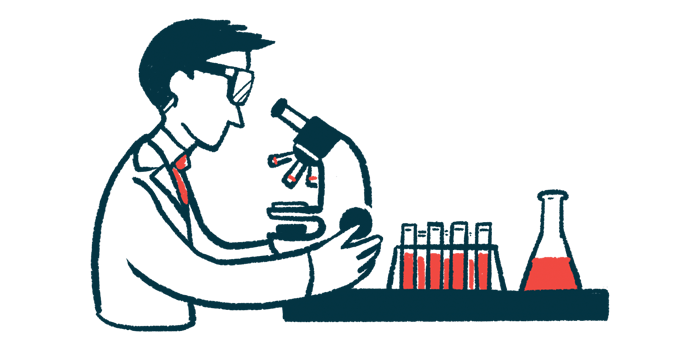Ovarian cancer immunotherapy found to boost immune response
Trial data show IMNN-001 increases levels of anti-tumor molecules
Written by |

IMNN-001, Imunon’s experimental immunotherapy for advanced ovarian cancer, boosts the body’s natural immune response by increasing levels of immune signaling proteins that aid in attacking tumors, new clinical data show.
These results, from the Phase 1/2 OVATION 2 trial (NCT03393884), help explain how the treatment may be working at a molecular level, according to the U.S.-based developer. The data also support earlier findings from the ongoing trial, in which patients receiving IMNN-001 alongside chemotherapy showed clinically meaningful improvements in survival.
“The clinical outcomes, showing a robust increase in overall survival for women with advanced ovarian cancer treated with IMNN-001 plus standard-of-care chemotherapy, align with these [new] pharmacological and immunopathological findings,” Douglas V. Faller, MD, PhD, chief medical officer of Imunon, said in a company press release. Immunopathology is the study of the role of the immune system in disease processes.
According to the release, these “robust translational results” serve to “bolster IMNN-001’s potential in advanced ovarian cancer.”
The company presented the new data in a poster, titled “Immune biomarker analysis of the OVATION-2 trial, a randomized phase I/II study of IL-12 gene therapy IMNN-001 in combination with neo/adjuvant chemotherapy (NACT) in newly-diagnosed advanced epithelial ovarian cancer (EOC),” at the 2025 ESMO Gynaecological Cancers Congress, which took place June 19-21 in Vienna.
Imunon also announced the launch of a pivotal Phase 3 clinical trial testing IMNN-001, noting in the release that the “first two sites [have been] initiated.”
New data strengthen case for advancing clinical testing of IMNN-001
Imunon had previously reported promising results from OVATION 2. Those results showed that patients treated with IMNN-001 plus chemotherapy lived more than a year longer on average compared with those receiving chemotherapy alone.
Now, with new molecular findings presented at ESMO supporting how the therapy may work at a biological level, the company says the data strengthen the case for moving forward with further clinical testing. The next study, the Phase 3 OVATION 3 (NCT06915025) trial, expects to enroll about 500 women with a confirmed ovarian cancer diagnosis. No location information has thus far been provided.
Ovarian cancer, one of the most common types of gynecological cancer, begins in the ovaries — the organs that produce eggs, and hormones such as estrogen and progesterone that are important in female reproduction. Most ovarian cancers arise from epithelial cells, which form the outer layer of the ovary.
About 70% of epithelial ovarian cancer cases are diagnosed at an advanced stage, when the disease has already spread and treatment becomes more challenging. A common treatment approach in these cases is neoadjuvant/adjuvant chemotherapy (N/ACT), chemotherapy given before and after surgery.
While this regimen can shrink tumors and make surgery more effective, the cancer often returns, and long-term outcomes remain poor.
Immunotherapy aims to improve outcomes in advanced ovarian cancer
With IMNN-001, Imunon aims to improve outcomes for those with advanced epithelial ovarian cancer. The treatment is injected directly into the abdominal cavity, where it can enter cells near the tumor. Once inside, it’s designed to trigger those cells to produce more of a protein called IL-12. IL-12 is a type of cytokine — a natural signaling molecule that helps activate the immune system to recognize and attack cancer cells.
IL-12 signaling in turn promotes the production of other immune cytokines, such as interferon-gamma (IFN-gamma) and tumor necrosis factor-alpha (TNF-alpha). These molecules help the immune system target and kill cancer cells.
In the OVATION 2 trial, Imunon is comparing IMNN-001 combined with standard chemotherapy (N/ACT) to chemotherapy alone. The study enrolled 112 people with newly diagnosed advanced epithelial ovarian cancer, who have now been followed for a median of 31 months, or slightly longer than 2.5 years. Earlier results showed that adding IMNN-001 reduced the risk of death by approximately 30% compared with chemotherapy alone.
[These new data] strongly complement the compelling overall survival results from the OVATION 2 trial.
According to Faller, the new data presented at ESMO addressed the molecular effects of IMNN-001 in treated participants and “strongly complement the compelling overall survival results from the OVATION 2 trial.”
Researchers now analyzed samples of fluid from the abdominal cavity in 15 participants before and after IMNN-001 infusions. Levels of IL-12 were about 27 times higher after treatment compared with before treatment, Imunon reported. This suggests the therapy is successfully increasing IL-12 production, according to the company.
Levels of IFN-gamma and TNF-alpha also increased substantially after treatment, by about 62 times and 36 times, respectively. In contrast, levels of these cytokines in the blood remained low, “demonstrating the tumor-localized effect of IMNN-001,” the researchers wrote.
Overall, Faller said, “these results validate that IMNN-001 induces IL-12 and its downstream anti-tumor effectors, IFN-[gamma] and TNF-[alpha], exclusively at the tumor site with minimal systemic exposure, supporting our ongoing Phase 3 OVATION 3 trial.”
The OVATION 3 trial will evaluate whether adding IMNN-001 to standard treatment, like N/ACT and maintenance therapy, improves outcomes compared with standard treatment alone. The main goal of the study is to measure overall survival, but it will also assess how well patients respond to chemotherapy and surgery.





